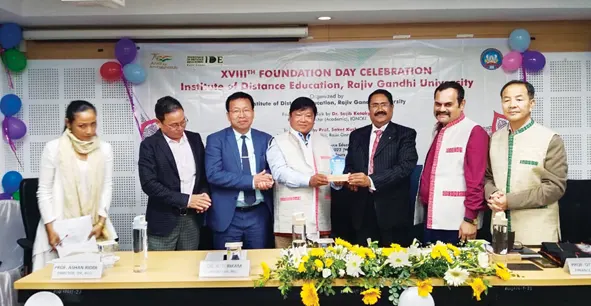RONO HILLS, 9 Nov: The Institute of Distance Education (IDE), Rajiv Gandhi University (RGU) celebrated its 18th foundation day on 9 November.
“Today IDE, RGU has attained adulthood as it has completed eighteen years of its existence,” RGU Vice Chancellor Saket Kushwaha said.
He stated that online and distance mode of education offers a wider range of options to its learners as it rises above the confines of fixities of conventional mode of education.
The VC also highlighted the fact that UGC has deemed both forms of degrees to be at par with each other. “Thus, people who have completed their degrees from distance mode are given equal preference in jobs as is done to those who have completed their education in the conventional mode,” he said.
He predicted that digital form of education is going to surge in the times to come.
“It is, therefore, important for the institute to collaborate with other such institutes to offer mutual motivation to the learners in the institute,” he said.
The VC congratulated the institute for achieving what it has in the present day and wished that the institute will continue to grow in the years to come.
On the occasion, Kushwaha inaugurated non-formal Sanskrit education at the IDE.
This is a joint initiative of the RGU and the Central Sanskrit University, New Delhi, to propagate Sanskrit learning in India.
The IDE, RGU has been chosen for this task. The certificate course will start from the current academic session.
IGNOU, Itanagar regional director (academic) Dr. Sanjib Kataky spoke on the topic ‘Relevance of online and distance learning in the present world order.” He gave a historical overview of the development of distance learning which started from University of London-the first University in the world to offer distance learning degrees by establishing its external programme in 1858.
He also mentioned that the first distance learning institute in India is Dr. BR Ambedkar Open University (formerly Andhra Pradesh Open University).
Kataky also highlighted the role of IGNOU in spreading the distance mode of education both at the national and the international levels. He said that distance and online education is the fastest way to improve the quality of human resource all over the world in general and the nation in particular, provided the deliverance of quality education.
RGU registrar Dr. NT Rikam opined that along with spreading of distance learning it is essential to introspect the quality of education that is being imparted by the institute. In order to achieve this, he said, importance of setting high benchmark should be of utmost priority.
Dr. Rikam suggested comparing the standard of the institute to other such institutes recognized worldwide.
RGU finance officer prof. Otem Padung appreciated the role of the former directors of the institute for the seamless effort that they have put for the development of the Institute.
“The institute has been a boon to those government officials who want to improve their skills but do not have the time to attend formal classes,” prof. Padung said.
He cited the example of many employees of the university who have been promoted to higher posts courtesy the degree provided by the institute.
Earlier, IDE RGU director prof. Ashan Riddi highlighted the objectives of the Institute of Distance Education.
He acknowledged the distinction of offering master and bachelor degrees through the IDE to those who had to drop out from the conventional education due to various unavoidable circumstances.
Prof. Riddi informed the participants that the institute has conducted a total of 19 online programmes ranging from workshops and seminars to faculty development programme during the Covid -19 period.
On the occasion, the institute acknowledged the contributions made by all the former directors and the subject coordinators to the growth of the IDE, RGU.
The programme was hosted by RGU assistant professor Moyir Riba.
Deans of all faculties, heads of all departments, subject coordinators and faculties of the departments of economics, education, English, Hindi, political science, sociology attended the programme.
The institute, which started its journey in 2005, has played a pivotal role in bringing formal education to the doorstep of those who cannot attend classes in conventional mode of education.
It offers masters degree in economics, education, English, Hindi, political science and sociology. The institute also offers degree courses in all those subjects and tribal studies to targeted learners.
In addition, it also offers certificate courses in Japanese language (Basic), Sanskrit, cyber security, introduction to mobile architecture, multimedia & animation, barefoot wireless engineers, English for communication, fisheries technology and digital video editing.




